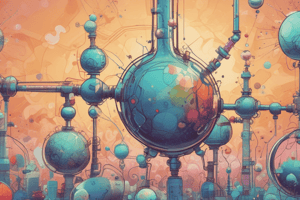Podcast
Questions and Answers
What is formed between a reactant and a catalyst, according to the intermediate complex theory?
What is formed between a reactant and a catalyst, according to the intermediate complex theory?
An unstable intermediate
What is the term for the accumulation of one substance at the surface of another?
What is the term for the accumulation of one substance at the surface of another?
Adsorption
What is the effect of fine division or porosity of the catalyst on the reaction rate?
What is the effect of fine division or porosity of the catalyst on the reaction rate?
The reaction rate increases
What are substances that block active sites on the catalyst, thereby reducing the reaction rate?
What are substances that block active sites on the catalyst, thereby reducing the reaction rate?
What is the term for a reaction in which heat is lost, as indicated by a negative ∆H?
What is the term for a reaction in which heat is lost, as indicated by a negative ∆H?
What is the effect of a 10K increase in temperature on the number of collisions between reactants?
What is the effect of a 10K increase in temperature on the number of collisions between reactants?
How is the instantaneous rate of reaction determined?
How is the instantaneous rate of reaction determined?
What is the relationship between concentration and rate, according to the experiment?
What is the relationship between concentration and rate, according to the experiment?
What is the purpose of the catalyst in a reaction, according to the surface adsorption theory?
What is the purpose of the catalyst in a reaction, according to the surface adsorption theory?
What is the definition of a catalyst, and how does it differ from the reactants in a chemical reaction?
What is the definition of a catalyst, and how does it differ from the reactants in a chemical reaction?
What is the difference between heterogeneous and homogeneous catalysis?
What is the difference between heterogeneous and homogeneous catalysis?
What is the role of activation energy in a chemical reaction?
What is the role of activation energy in a chemical reaction?
What is the definition of an effective collision in a chemical reaction?
What is the definition of an effective collision in a chemical reaction?
How does the concentration of reactants affect the rate of a reaction?
How does the concentration of reactants affect the rate of a reaction?
What is the instantaneous rate of a reaction?
What is the instantaneous rate of a reaction?
What is the role of manganese dioxide in the decomposition of hydrogen peroxide?
What is the role of manganese dioxide in the decomposition of hydrogen peroxide?
What is the difference between autocatalysis and other types of catalysis?
What is the difference between autocatalysis and other types of catalysis?
What is the intermediate formation theory, and how does it relate to homogeneous catalysis?
What is the intermediate formation theory, and how does it relate to homogeneous catalysis?
How does decreasing the activation energy affect the rate of reaction?
How does decreasing the activation energy affect the rate of reaction?
How can the activation energy of a reaction be changed?
How can the activation energy of a reaction be changed?
How can a catalyst lower the activation energy of a reaction?
How can a catalyst lower the activation energy of a reaction?




